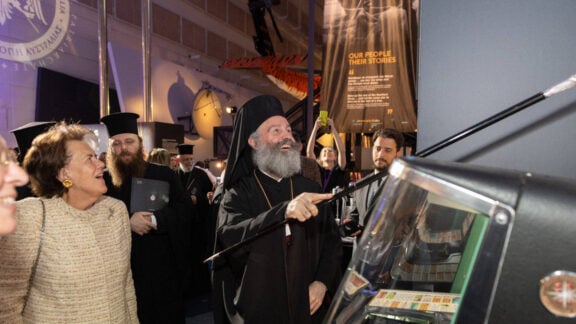Our beloved Efstathia Spiropoulos was born on 10 June 1920, in the midst of the Greco-Turkish War of Asia Minor. She was born in a small village called Flessiada, outside Kalamata in the Peloponnese. Her parents were Anastasios and Athena Angelopoulos. Efstathia was the second of six siblings. She had an older sister, Panagiota, three brothers—Adonis, Georgos, and Niko—and a younger sister, Arsinoi, 13 years her junior and the only surviving sibling.
Efstathia grew up in difficult times. In the 1920s, her earliest memories were of working the land with her family to put food on the table. Greece had been at war for nearly a decade before her birth, and conflict continued until 1922. The land, left neglected for so long, was hard to cultivate, so everyone worked together to survive.
Just as they began recovering from the war, the Great Depression hit Greece. Her father lost his life savings overnight. Once again, the family faced hardship. Efstathia loved school and excelled in her studies, but she had to stop attending in order to help with chores. Still, she often said they were the lucky ones—they were landowners and always had food, while others starved. Her mother always kept a plate aside for someone in need.
Throughout her childhood and teenage years, Efstathia cared for livestock, helped in the vineyard and olive grove, made cheese, cured olives, tended the vegetable garden, sheared sheep, spun wool, wove blankets and sheets on the loom, and looked after her younger siblings and grandparents. The work was never-ending, but they were happy.

After the Great Depression, World War II began—yet another war lived and survived. She was just 19 when German forces invaded her village. Food supplies were taken, and every day was a struggle to survive. Together with her older sister, her priority was to protect their younger siblings, taking them to safety in the mountains. From there, they watched a neighbouring village burn to the ground.
When WWII ended, the Greek Civil War erupted. From December 1944 until 1949—five long years—brother fought against brother, communism against democracy. Efstathia was now 24. There were no outings, no cinemas—only survival.
In 1946, she fell in love with Peter Spiropoulos. Not wanting to wait for the war to end, they eloped and married right away. Within a year, their first son, Paul, was born. They were blissfully happy, but within six weeks, Peter was called to fight. He was gone for four long years. During this time, Efstathia worked tirelessly to care for their son and keep the household afloat. When Peter returned, he was amazed—the cupboards, once bare, were now filled with flour, rice, coffee, lentils, beans, and more. No one worked harder than Efstathia.
She went on to have six more children—all born at home, with only a local woman to help. Her seven children were: Paul and Kosta; daughters Anna, Athena, Georgina, and Stavroula; and her youngest son, Anastasios.

Finally, peace came to Greece. Efstathia and Peter worked hard to provide for their large family. Their children were shielded from hardship and enjoyed a joyful childhood. They remembered cold winter nights huddled around the fireplace, listening to their mother’s stories, wind whistling outside. They didn’t have many toys—but who needed toys when nature was your playground?
In search of a better life for their children, the family migrated to Australia in September 1964, sponsored by her brother George who had arrived in 1954. They journeyed on the ship PATRIS and arrived at Station Pier, Port Melbourne, in October. With incredible courage, Efstathia brought her family—without knowing a word of English. The eldest child was 17; the youngest, just 18 months.
Everything was difficult at first, but they quickly adapted. Peter worked at Ford Motor Company, and Efstathia at a tile factory in Coburg. The following year, they bought a house in Fawkner, where she would live for the next 60 years. The backyard soon blossomed with fruit trees and a magnificent vegetable garden. She adored Fawkner, calling it the best suburb in Australia—close to the school, shops, and most importantly, the Greek Orthodox church, Agios Nektarios. She had wonderful neighbours—the Ward family on one side and the Iera family on the other. They shared food over the fence and celebrated together. Efstathia called Australia “paradise on Earth.”
She worked extremely hard in the factories and was grateful for the opportunity. She worked as if her life depended on it. There was no such thing as “slow and steady”—her employers noticed, often giving her extra pay because she did the work of two people. Her work ethic was unmatched.
Within five years, Efstathia and Peter opened their own business on Gaffney Street, Coburg. She ran the milk bar while he ran the coffee shop next door. With courage and minimal English, they thrived.

These were happy times. Their home was always filled with guests, and Efstathia’s hospitality became legendary. Her diples and kourabiedes were known as the best in the world. She was warm, kind, and generous—her smile lit up every room.
As her children grew and married, they moved across Melbourne, but Fawkner was always home. Efstathia remained the heart that drew everyone back. With the arrival of grandchildren, the house filled with laughter. Family celebrations—weddings, christenings, birthdays, Easter, and Christmas—all centred around her. She never complained, always cooking, cleaning, and caring for everyone.
A truly remarkable woman who lived an extraordinary life. She returned to Greece many times, and at 93, she travelled to Jerusalem and Paris. At 96, she visited her granddaughter Efstathia in California, and then Chicago—where her father had once visited. At 102, she caught COVID—unvaccinated—and survived. We were blessed with two more years with her.
At 104, she grew tired. On Monday 15 July 2024, she didn’t wake up, and passed away peacefully in her bed in Fawkner on Tuesday 16 July.
Efstathia was blessed with seven children, 22 grandchildren, and 33 great-grandchildren. She was our matriarch and will be deeply missed. Yet we rest in the knowledge that a part of her lives on in each of us.
May her memory be eternal.
Rest in peace, beautiful, darling Efstathia. You touched so many hearts with your kindness and generous spirit. You are loved by all.
Rest in peace, dearest mother, grandmother, and great-grandmother.
May your memory be eternal.









